Michelle Douglas, Australian Mills & Boon author, read her first M&B when she was nine: An editor’s thoughts on love (Part Two)
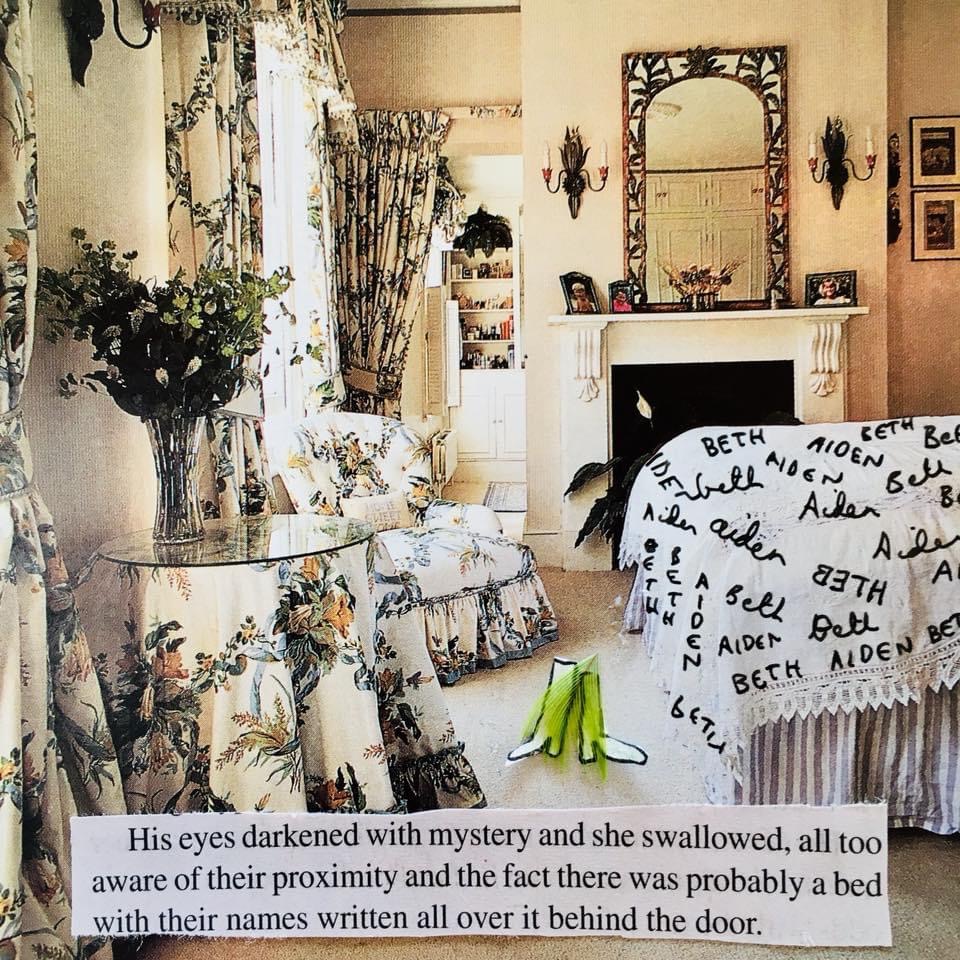
In this article, Fremantle Press publisher Georgia Richter interviews a Mills & Boon author.
When my friend was fourteen, he used to go to a mate’s place to read his friend’s mother’s Mills & Boons. Those
books with the purple spines taught my friend a lot. When he tells me this, it occurs to me that maybe at fourteen I only told my friend Fran that I wanted to write an M&B because I wanted an excuse to read them. (Fran, I reckon, was always in it for the moolah: it wasn’t for nothing she was known as Practical Phran.)
Michelle Douglas, Australian Mills & Boon author, read her first M&B when she was nine. She loved the African setting of this doctor and nurse story. By the age of fourteen, she had read all the M&B books owned by her mother and grandmother. The books were cheap and her family not well-off, so that’s what they bought, or borrowed from the library.
Based on this tiny survey, I conclude there is a sub-audience of fourteen-year-olds who are drawn to M&B like teenage moths to the flame (to nick the title of one of the books Fran and I once read as we fought our way into the romance writing game).
In her twenties, Michelle used to go to her friend’s share house where, behind the academic books, were rows of M&Bs. The friend wanted to write one and, after Michelle encountered Romance Writers of Australia, she recognised the same ambition in herself.
The first bunch of manuscripts she submitted to M&B were based on the traits of the books she’d grown up reading. But M&B, with its rapid manuscript-to-shelf writing times, is a social barometer. After many rejections, Michelle made her novels more contemporary, and got her first manuscript accepted in 2007. Thirty-five novels later, she is making her living from her work – not something many Australian writers can claim.
This idea of cultural evolution in what I thought was a static genre is just one of the things that surprised me during my interview with Michelle Douglas. I spoke to her via Zoom, fresh from reading one of her most recent titles, Cinderella and the Brooding Billionaire, in which it was my pleasure to meet the eponymous brooder, Luca, and Aussie angel, Monique.
Here are the things I learned from Michelle.
‘That pure shot of hero and heroine intensity’
What constraints does Michelle Douglas work under? Turns out there are quite a few.
Michelle writes for the Forever line, which publishes out of the UK. Exotic locations and far-flung places are de rigueur, though cowboys have been moved on to the Americans, and royalty and sheiks have gone to the Modern line.
At 50,000 words per book, there is no room for messing around. So keep it focused, keep it tight. There is no room for Thomas Hardy landscape witterings here.
The hero and heroine have to be on the page as much as possible. The inscrutable hero of yore has gone: now his point of view occupies between forty and sixty per cent of a book.
Secondary characters are a scourge and must be prevented from having their own backstory.
MD: I can’t waste those 50,000 words exploring the heroine’s relationship with her alcoholic mother and the troubles she is having with co-workers, or the hero’s fifteen-year-old daughter getting into trouble. Four lines of dialogue between hero and heroine can sum up what has happened. That way, anything else that happens it is happening through them.
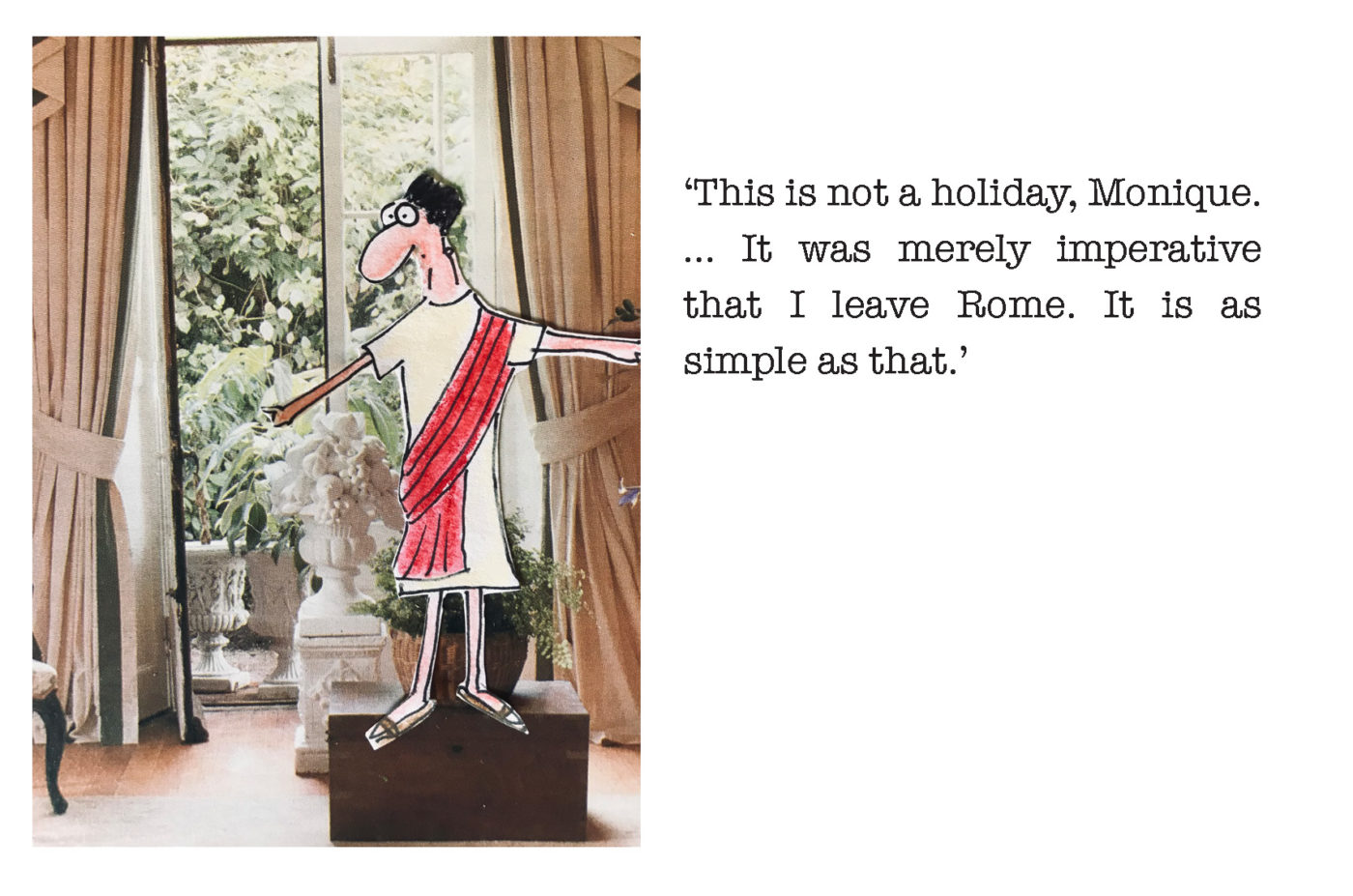
No wonder Luca and Monique have to escape Rome for Luca’s deserted Casa Sperenza in Tuscany. They won’t be bothered by any secondary characters there.
Shut the bedroom door!
In the Forever line, what constraints apply to sex scenes?
There’s lots of heavy petting, obvs, but when the clinch comes to the crunch, Michelle tells me, the bedroom door stays firmly closed. The rest of the house is out of bounds too. As Luca says, he ‘could not take her on the kitchen table where anyone could walk in.’
Sometimes Michelle writes sex wilder and then pulls back. Sometimes her marshmallow beta hero needs to alpha up. Her heroes are heartful, sensitive guys, but I saw at least one instance in which Luca allowed himself a ‘totally male, totally wolfish smile’. He tells Monique: ‘I am going to make such love to you that your knees will go weak and your bones will turn to water.’
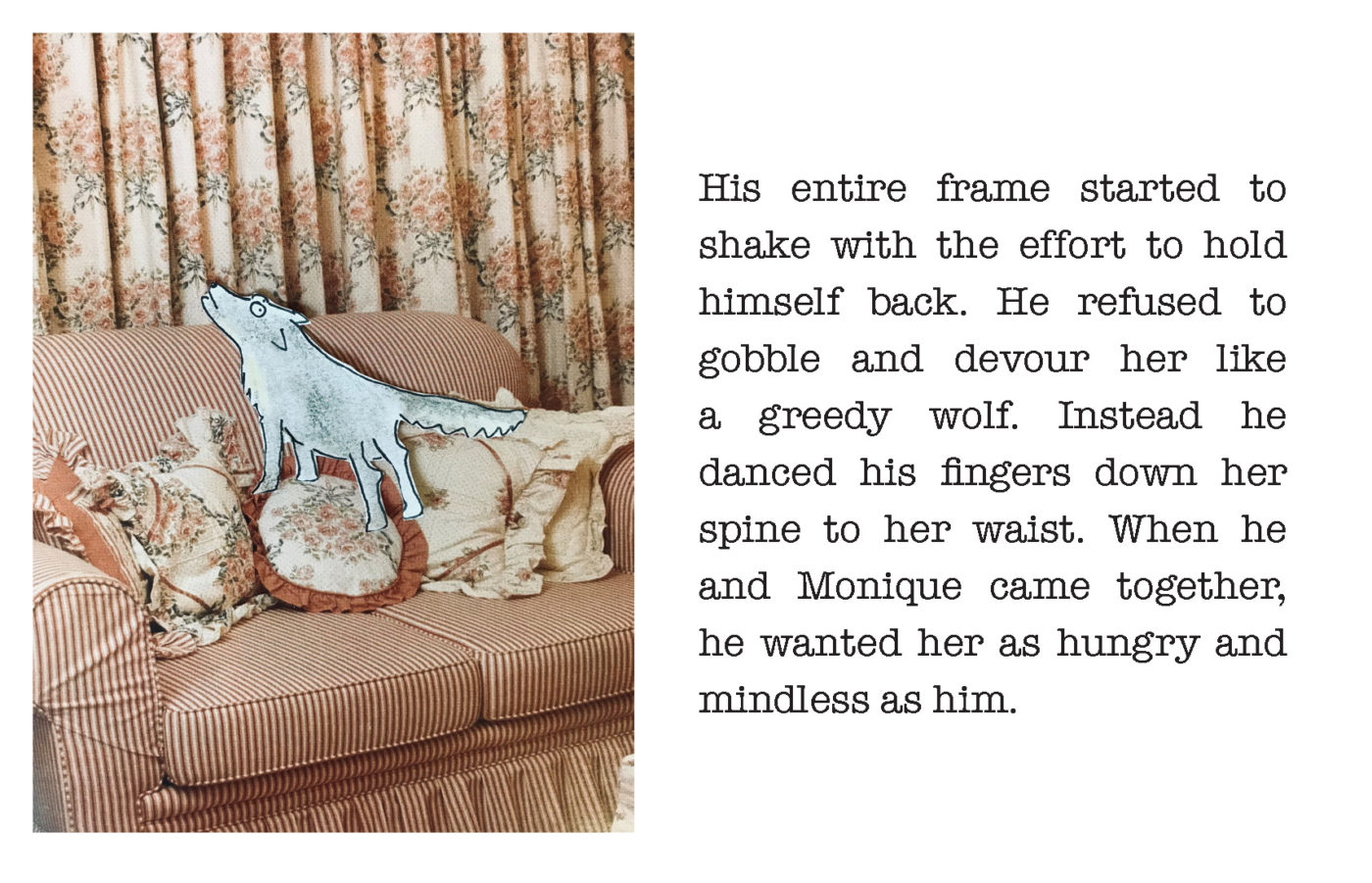
Though there is plenty of steamy friction in Michelle’s fiction, what readers in the Forever line want at the moment of consummation is to inhabit the emotional terrain of the sexual act. Just when we think the wolf will have his day, Luca goes full metaphor and becomes a new man made of ‘steel and diamonds and sunlight’.
If you want guaranteed sex scenes, says Michelle, then head to the M&B Modern line where the bedroom door has been open for decades.
Michelle doesn’t find writing good sex hard work. In fact, she finds it fun. And she says that times are changing in the Forever line.
MD: My line sells ridiculously well overseas: Germany, France, Italy. We have huge translation markets. Those markets have asked for racier stories from the people in my line.
We don’t have to write sex if we don’t want to, but it is fun to write. There are some readers who feel that if they are not going into the bedroom with the characters, they are missing out on how that character develops. So I think it is important to focus what happens emotionally for the characters during those scenes, not just Tab A going into Slot B.
One thing you can count on though: consent will never be an issue.
MD: You don’t want consent to be in any doubt whatsoever. You don’t need to stop the action but your heroine needs to be consenting whether she is making the first move or not. Back in the seventies, there was a lot more forced seduction, but that won’t fly anymore. I wouldn’t even try it. The hero would just be icky.
A rose by any other metaphor
If I learned one thing from Michelle’s metaphors, it is plus ça change … At different times Luca is a wolf, a dragon and a fizzing den of electrified atoms. From Luca’s perspective, Monique, with her ‘caramel eyes and caramel hair’, is mostly edible. In the spirit of Edward Cullen, Luca speculates that his gelato-eating date would taste ‘cool and tangy’. Monique, on the other hand, sees herself as a (presumably inedible) fortress.
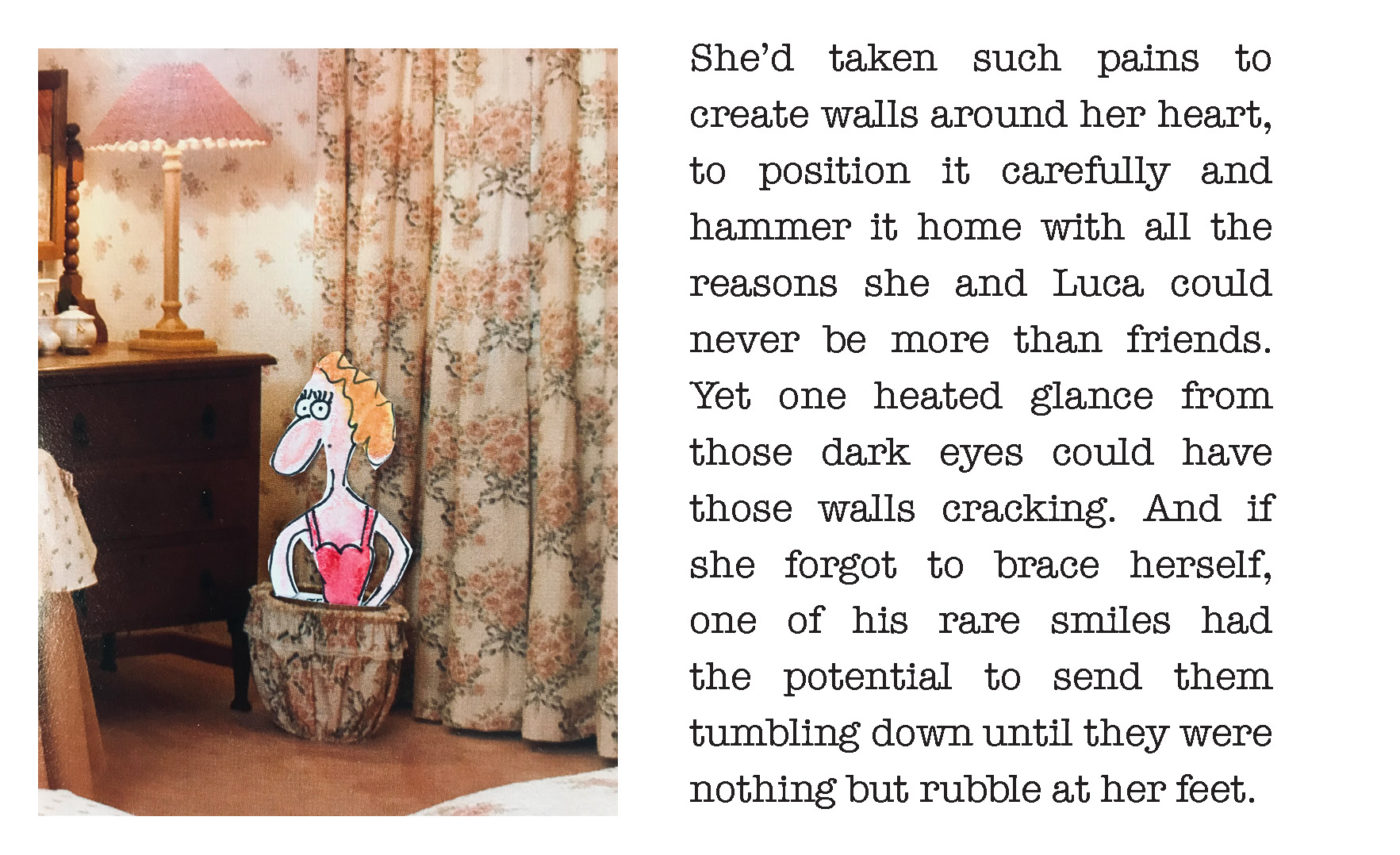
The phallus, bless it, is never far from the action. The ol’ toilet-door graffiti maxim still holds: A good man is hard to find. A hard man is good to find.
As Monique moistens her lips, Luca’s dark eyes ‘bore into her’; the heat ‘stampedes through his veins’ and elsewhere, his blood ‘pounds so hard he feels bruised from the inside out’. Like Mr Darcy, Luca has to prescribe himself a ‘gruelling run’ to drain his desire away.
The romance of feminism
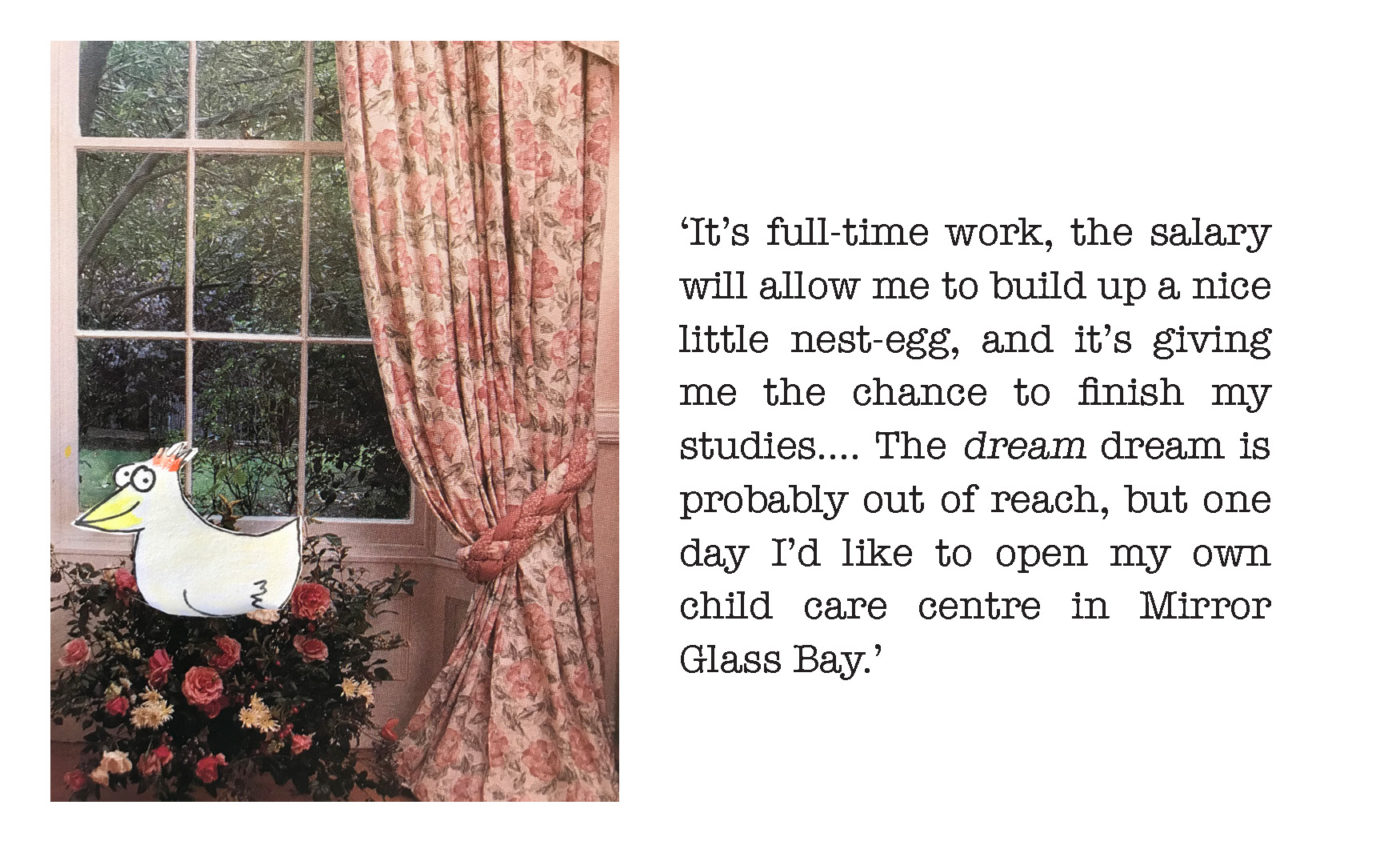
What is the place of feminism in an M&B? You might think it would be as absent as a pair of posturepedics, but in fact, Michelle write her novels with a conscious feminist sensibility. In the case of Cinderella, Michelle’s protagonist is an independent single woman who has found herself raising her young niece, Fern. Monique only takes the nannying job with Luca so she can top up her bank account on the way to realising her dream. As far as feminist themes go, this is a set-up that will bear fruit later. (‘Read on!’ as Mr Bennett says. ‘Read on!’)
When she started out writing, some of her characters experienced issues which led to other characters expressing views Michelle herself did not agree with.
MD: I got caught up on the craft and the structural stuff at the expense of politics. Now I’m uneasy with the politics in some of my early books. I have a heroine who regrets having an abortion, while the hero is angry that she had an abortion. It wasn’t his child: she had been raped. I so wish I could rewrite that book so she is totally non-apologetic.
I wrote another book where the heroine asked her best friend to be a sperm donor. When she gets pregnant, he wants to get more involved. She is horrified. His argument is that a child needs both parents. We know that is crap. But you don’t always write characters that share your values.
Did she know these characters didn’t share her values, even when she was writing them?
MD: Yes, I did. I didn’t think it mattered. But now I think it does. Those books espoused politics that are detrimental.
And so, somewhere along the line, she decided: My character, my views.
MD: It is my own progression, of being more aware. It is a decision I have made as a feminist. There is the argument that romances are anti-feminist because they focus on the marriage plot, or that they are feminist because they are books written by women about women for women. But both those things are wrong. I am angry that a single genre is singled out to say ‘you should be feminist’. It is not asked of a mystery plot or thriller or literary fiction, so why pick on romance to be politically correct? Like any other genre, some books are feminist, others are not, and some are inbetween.
Just because she writes with feminism in mind, doesn’t mean she thinks everyone should.
MD: Why does every Mills & Boon writer have to be a feminist? I do want to write romances that are, if not feminist, at least positive for women. At the same time, I feel as if female fantasy has been policed from the day dot. But if women want to read BDSM or a rape fantasy, don’t beat up on them. I’m not going to stop anybody else from reading what they want. For instance, motorcycle club fantasies are huge at the moment.
The fantasy of equality
Here is the fantasy in every M&B: you get to hook up with the partner of your dreams. They are seriously good looking, there’s chemistry between you, and they are so rich you never have to worry about money again. This fantasy is the reader’s for only $12.99, or $3.99 on ebook.
MD: The readers who are reading Mills & Boon are after escape. They are not after the writing undermining or belittling what they love. No one is saying that these books are changing the world, but they are going to provide the reader with three hours of escape from having to do laundry and listening to the kids moan.
But the second fantasy Michelle says you will find in her books is the fantasy of equality. In her novels, there is often a baby in the picture-his or hers-and the hero is eager to be present and to share the child-rearing on equal terms.
MD: That’s more an essential fantasy. The billionaire can sweep you off to his island, but if he is also promising equality, then it is fantasy wrapped up in the most beautiful packaging ever.
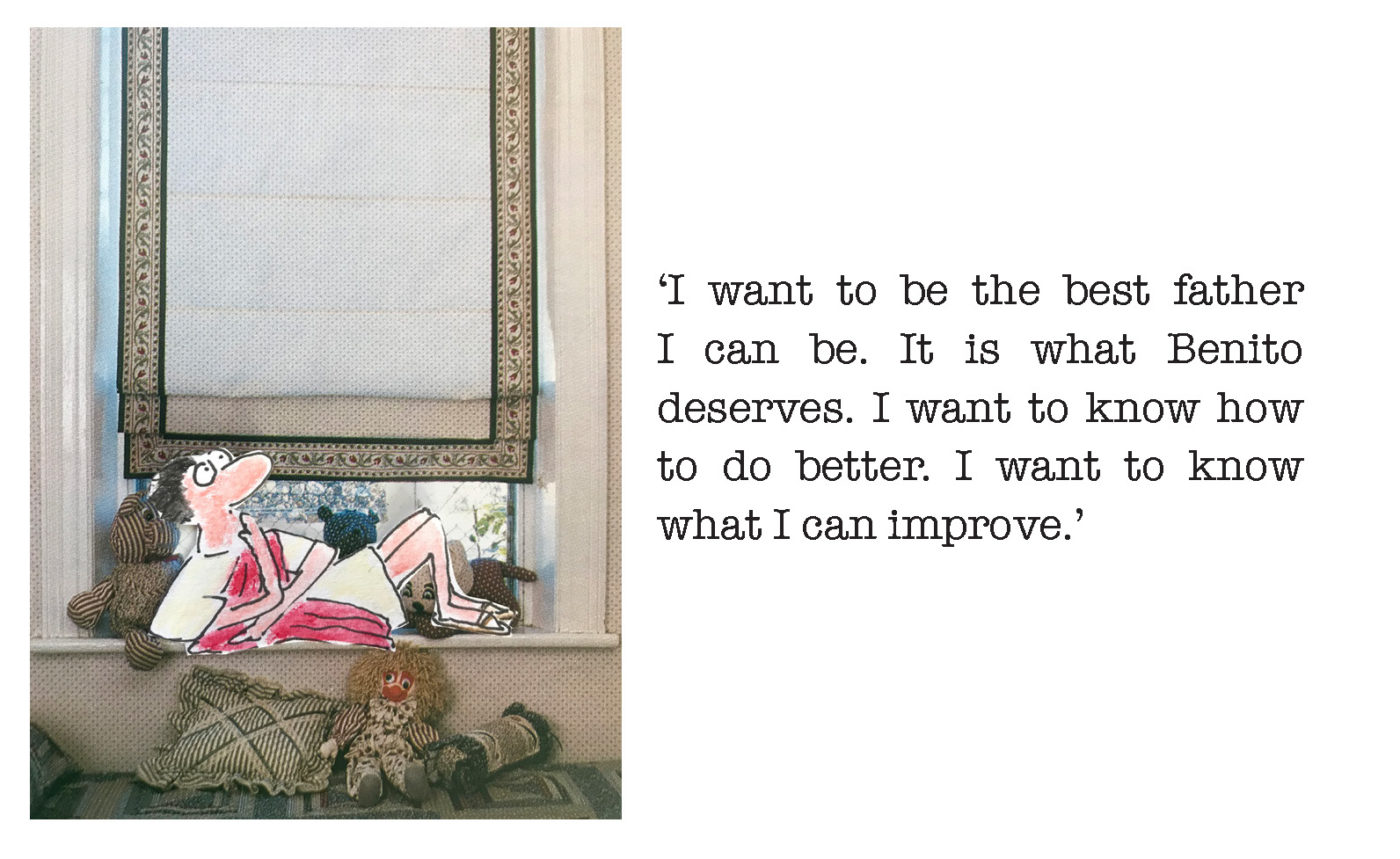
‘This pair are going to make it forever’
Is ‘love’ just another term for gratification delayed? I asked Michelle.
Not at all, she says.
MD: You can’t write an M&B if you don’t believe in love, because your readers want love too. Though maybe if you just believed in the intensity of sex, you could get away with it. A lot of erotica is happy-for-now rather than a happy-ever-after.
Of course, the romance genre is only interested in exploring romantic love, though there might be other forms of love in the story (children, family, best friends). And we are not talking about the entire sexual spectrum. A Mills & Boon doesn’t focus on people who are asexual, for instance.
In the world view of my characters, there is sexual love and there is emotional love-they find themselves drawn to each other so strongly, and they think it might just be the physical attraction, but beneath that is a much deeper attachment and that is why they feel so attracted to each other.
Then she reminds me of a part of the plot that I hadn’t considered until now.
MD: Sometimes on the journey, the character acknowledges that they think this affair has ended and they are never going to get back together, but now they have learned their lesson and they are not afraid they can’t continue their journey alone. Sometimes you need your character to go on that journey and recognise their independence from that love.
So when Monique pulls of out the Tuscan-villa, hot-sex situation to return to Australia, she is participating in an important third fantasy: the one of the heroine’s self-actualisation.
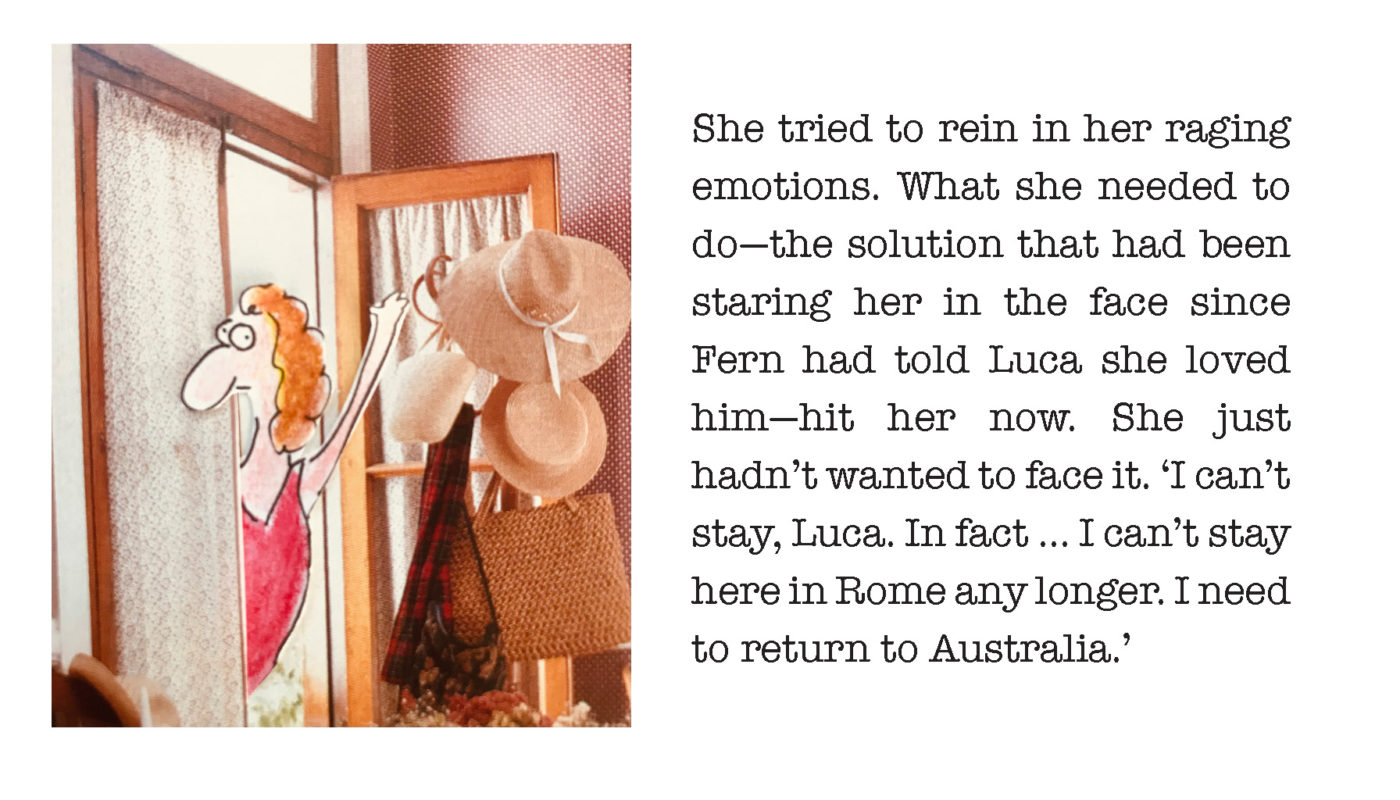
MD: Maybe that is the space where the heroine recognises that she is worthy without anybody else, and that will be the true equality when they come back together. She is not reliant on anyone else for her happiness and wellbeing, it is just that her life is better with this man in it.
When Lizzy turns down Darcy in Pride and Prejudice, would he have respected her if she hadn’t turned him down and he didn’t have to work for her? This is the moment of equality that cancels out the money. The heroine says, ‘I don’t care about the life you have to give me because it means I would have to give up my self-respect.’
I see it now: it’s the Pretty Woman moment: the heroine would rather give up everything and go back to her bare bones life, if it means she keeps her dignity. Self-ejected from Casa Sperenza, Monique goes home to Australia to reclaim herself. And so the heroine who is on her journey of independence realises she can do without the hero. Meanwhile, the hero is realising that he might have everything, but until he has her, he has nothing. And so the reunion occurs on these equal terms.
What lies at rainbow’s end
The thing to remember, Michelle reminds me, is that because M&B novels have such short lead times, they are real time expressions of (one part of) our culture. What these fantasies depict is the aspirations of contemporary readers. And such aspirations can change over time. In her books, there is the hope not only of satisfying consummation, but of a decent partnership based on mutual regard and workload-sharing. I can get on board with that, and maybe Eliza Bennet would have as well.
In an M&B, the hero and heroine get to have their cake and eat it too.
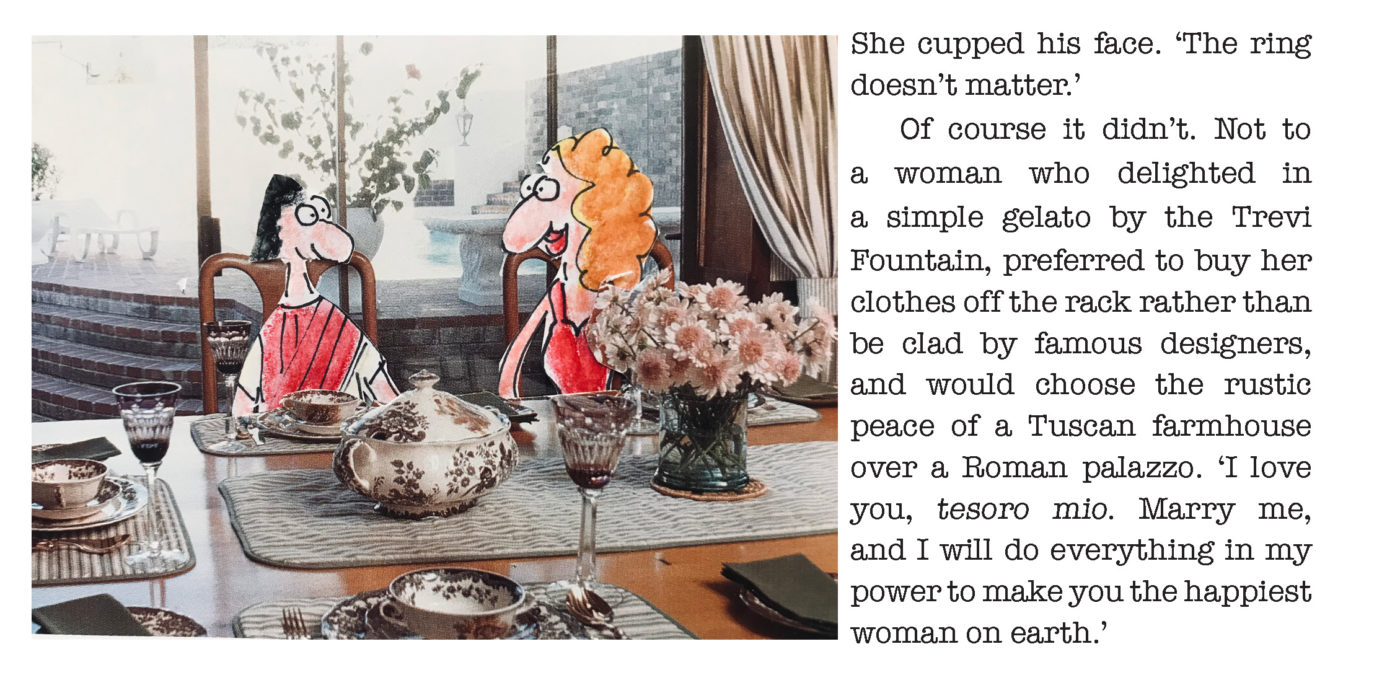
How excellent to have the kind of job where people seek out your work because you make them feel good. Like a reader finishing an M&B, I feel a warm glow at the end of our conversation-because of the way Michelle Douglas has shared her optimism, her work ethic, and the obvious affection she has for her readers. Props to her, and to all those who believe in the happily ever after.
References
Interview with Michelle Douglas, via Zoom, 17 January 2022.
Opening image: Nicola Marsh, The Boss’s Bedroom Agenda, Harlequin, 2009; drawing Georgia Richter. Other images: Lani Van Reenen, Biggie Best Curtains & Blinds, Struikhof Publishers, 1990; drawings Georgia Richter; text from Michelle Douglas, Cinderella and the Brooding Billionaire, Harlequin Romance, 2021.


